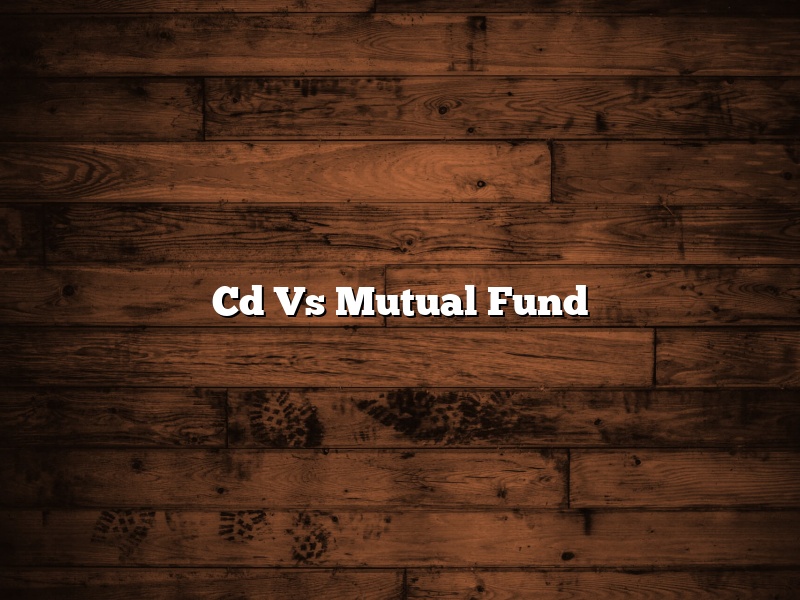Many people are unsure about what to do when it comes to their money. They may have some saved up in a certificate of deposit (CD), but they may also have heard about mutual funds and wonder if they are a better option. Here is a look at the pros and cons of CDs and mutual funds so that you can make an informed decision about what is best for you.
CDs are a type of savings account that offers a fixed interest rate. This means that you know exactly how much interest you will earn on your money and you can be sure that you will get that interest rate for the entire term of the CD. This can be a good option if you are looking for a safe place to store your money and you don’t want to worry about it losing value.
However, one downside to CDs is that you may not be able to access your money right away if you need it. This is because CDs typically have a fixed term, which means that you cannot withdraw your money until the term is up. This can be a problem if you need to access your money in a hurry.
Mutual funds are a type of investment account that allow you to invest in a variety of different types of stocks and bonds. This can be a good option if you want to spread your risk and invest in a number of different things. However, mutual funds also come with some risks. If the stock market crashes, for example, your mutual fund may lose value.
Another downside to mutual funds is that they can be expensive. You may have to pay a management fee, as well as a fee to buy and sell shares. This can add up over time and can eat into your profits.
So, which is better? CDs or mutual funds?
Ultimately, it depends on your individual needs and goals. If you are looking for a safe place to store your money and you don’t want to worry about it, a CD may be a good option. However, if you want to invest in a number of different things and are willing to take on some risk, a mutual fund may be a better choice.
Contents [hide]
Is a mutual fund or CD better?
When it comes to savings, there are a lot of options to choose from. Two of the most common are mutual funds and CDs. Both have their pros and cons, so which is the best for you?
Mutual Funds
Mutual funds are a collection of stocks, bonds, and other securities. When you buy a mutual fund, you’re buying a piece of this collection. This can be a good option if you don’t have enough money to buy individual stocks or bonds.
Mutual funds offer two main advantages. First, they offer diversification. This means that your investment is spread out among many different securities. This reduces your risk if one of them performs poorly.
Second, mutual funds offer professional management. A fund manager will choose which securities to buy and sell, in order to achieve the fund’s goals. This can be helpful if you don’t know much about investing.
There are also some disadvantages to mutual funds. First, they can be expensive. Management fees and other expenses can eat into your return.
Second, mutual funds can be risky. The value of the fund can go up or down, depending on the market.
CDs
A CD, or certificate of deposit, is a type of savings account. You agree to deposit a certain amount of money for a certain period of time, and in return you earn a fixed rate of interest.
CDs offer two main advantages. First, they offer a fixed rate of interest. This means you know exactly how much interest you’ll earn, and you can plan for it.
Second, CDs are safe. Your money is insured by the FDIC, so you don’t have to worry about it disappearing.
There are also some disadvantages to CDs. First, the interest rates are often lower than those on other types of savings accounts.
Second, you can’t access your money until the CD matures. This can be a problem if you need to access your funds quickly.
So, which is better?
That depends on your individual circumstances. If you’re looking for a safe investment with a predictable return, a CD is a good choice. If you’re willing to take on a little more risk in order to potentially earn a higher return, a mutual fund may be a better option.
Can you lose money in CDs?
When you put your money in a certificate of deposit (CD), you’re essentially lending it to a bank or other financial institution for a set period of time. In exchange, the bank pays you a set interest rate on your deposit.
It’s possible to lose money in CDs, but it’s not likely. If you withdraw your money before the CD matures, you may have to pay a penalty. And if interest rates rise after you invest, you may not earn as much on your CD as you expected. But if you leave your money in the CD until it matures, you’re almost guaranteed to make a profit.
Is a CD a good investment option?
A CD, or certificate of deposit, is a type of savings account offered by banks. It is a savings account that offers a higher interest rate than a regular savings account, but with a catch—the money is tied up for a set amount of time.
Is a CD a good investment option?
The answer to this question depends on a few factors, including how long you are willing to tie up your money and the current interest rate environment.
At the moment, interest rates are relatively low, so a CD may not be the best investment option. However, if you are able to tie up your money for a longer period of time, a CD may be a good option, since the interest rate is likely to be higher than a regular savings account.
Overall, a CD is a good investment option if you are looking for a relatively safe investment and are willing to tie up your money for a set period of time.
Which is better CDs or stocks?
There are pros and cons to both CDs and stocks when it comes to saving and investing money. It can be tough to decide which is better for you.
When it comes to CDs, it is important to remember that they are not FDIC insured. This means that if the bank fails, your money is not guaranteed to be repaid. In addition, CDs usually have a low yield, meaning you will not earn a lot of money on your investment.
On the other hand, stocks offer the potential for greater returns, but they are also more risky. If the company you invest in goes bankrupt, you could lose some or all of your money. Additionally, you will need to pay taxes on any profits you earn from stocks.
Ultimately, the best decision for you depends on your personal financial situation and risk tolerance. If you are comfortable with taking on a little risk, then stocks may be a good option for you. If you are looking for a safe investment with a low yield, then CDs may be a better choice.
Are CDs a good investment in 2022?
Are CDs a good investment in 2022?
There is no definitive answer, as the answer will depend on a number of factors, such as interest rates and the overall economy. However, in general, CDs may not be as good of an investment option in 2022 as they were in previous years.
One reason for this is that interest rates are likely to be higher in 2022 than they have been in recent years. This means that the returns that investors can expect from CDs will likely be lower. In addition, the economy may not be as strong in 2022 as it has been in recent years, which could also lead to lower CD returns.
However, it is still important to do your own research to determine whether CDs are a good investment option for you in 2022. Factors such as your age, investment goals, and risk tolerance should all be taken into account.
How much will a CD earn in 5 years?
A certificate of deposit (CD) is a type of savings account that offers a higher interest rate than a standard savings account. In order to earn the higher interest rate, you must agree to leave your money in the account for a predetermined amount of time, usually between six and 36 months.
When you invest in a CD, you are essentially agreeing to give up access to your money for a certain period of time. If you need to access your money before the term of the CD is up, you may be subject to a penalty.
The interest rate on a CD can vary depending on the length of the CD, the amount of money you invest, and the financial institution you choose.
The table below shows the interest rates offered on CD’s at five of the largest banks in the United States.
Bank CD Term Length Interest Rate
J.P. Morgan Chase 6 months 0.01%
J.P. Morgan Chase 12 months 0.05%
J.P. Morgan Chase 24 months 0.10%
Bank of America 6 months 0.01%
Bank of America 12 months 0.03%
Bank of America 24 months 0.06%
Citibank 6 months 0.01%
Citibank 12 months 0.03%
Citibank 24 months 0.06%
Wells Fargo 6 months 0.01%
Wells Fargo 12 months 0.03%
Wells Fargo 24 months 0.06%
As you can see, the interest rates on CD’s vary greatly from bank to bank. The longer the CD term, the higher the interest rate.
So, how much can you expect to earn on a CD over a five-year period?
The table below shows the interest rates offered on CD’s at five of the largest banks in the United States, over a five-year period.
Bank CD Term Length Interest Rate
J.P. Morgan Chase 6 months 0.01%
J.P. Morgan Chase 12 months 0.05%
J.P. Morgan Chase 24 months 0.10%
Bank of America 6 months 0.01%
Bank of America 12 months 0.03%
Bank of America 24 months 0.06%
Citibank 6 months 0.01%
Citibank 12 months 0.03%
Citibank 24 months 0.06%
Wells Fargo 6 months 0.01%
Wells Fargo 12 months 0.03%
Wells Fargo 24 months 0.06%
As you can see, the interest rates on CD’s vary greatly from bank to bank. The longer the CD term, the higher the interest rate.
If you were to invest $10,000 in a five-year CD at a bank with an interest rate of 2.5%, you would earn $625 in interest over the five-year period.
How much does a 10000 CD make in a year?
10000 CDs is a lot of CDs. A lot of people probably want to know how much money they can make from selling that many CDs.
The answer to this question is not simple. There are a lot of factors that go into it. How much do you charge for your CDs? How often do you sell them? How much does it cost you to make them?
Assuming that you charge around $10 for a CD, and you sell them at a rate of 10 per day, you would make around $3600 in a year. This is not taking into account the cost of production, shipping, and other associated costs.
It is important to remember that not all CDs will be sold at the same rate. Some may sell more, while others may sell less. The important thing is to have a good estimate of how many you can sell in a year, and to price your CDs accordingly.
10000 CDs is a lot of CDs. A lot of people probably want to know how much money they can make from selling that many CDs.
The answer to this question is not simple. There are a lot of factors that go into it. How much do you charge for your CDs? How often do you sell them? How much does it cost you to make them?
Assuming that you charge around $10 for a CD, and you sell them at a rate of 10 per day, you would make around $3600 in a year. This is not taking into account the cost of production, shipping, and other associated costs.
It is important to remember that not all CDs will be sold at the same rate. Some may sell more, while others may sell less. The important thing is to have a good estimate of how many you can sell in a year, and to price your CDs accordingly.




